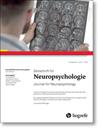„Neuropsychology for You“
IF 0.5
4区 心理学
Q4 CLINICAL NEUROLOGY
引用次数: 0
Abstract
Abstract: “My Logbook” is a method to translate evidence-based guidelines for psychosocial care in pediatric neurooncology into practice. One part of “My Logbook” is the standardized instrument “Neuropsychology for You,” developed by an interdisciplinary expert team. It consists of two booklets that include creative and challenging methods to support the implementation of basic standards into practice. The booklet “1, 2, 3 – All About Neuropsychology” focuses on neuropsychological therapy, while “Look Carefully – Psychosocial Assessment” addresses psychosocial assessment. Both booklets explain the topics in a patient-oriented and age-appropriate way and motivate patients to actively participate in two sessions each (psychoeducational, work and exercise, and reflection). The evaluation of the booklets showed a positive association between neuropsychological assessment and therapy. Furthermore, the patients’ positive emotions and the subjective level of information increased. Therefore, “Neuropsychology for You” is a promising tool for the practical and low-threshold implementation of neuropsychological assessment and therapy into clinical practice.“给你的神经心理学”
摘要:“我的日志”是一种将儿科神经肿瘤学中基于证据的心理社会护理指南转化为实践的方法。“我的日志”的一部分是由一个跨学科专家团队开发的标准化工具“你的神经心理学”。它由两本小册子组成,其中包括支持将基本标准付诸实践的创造性和挑战性方法。小册子“1,2,3——关于神经心理学”侧重于神经心理治疗,而“仔细看——心理社会评估”则涉及心理社会评估。这两本小册子都以患者为导向和适合年龄的方式解释了这些主题,并激励患者积极参加两次会议(心理教育、工作和锻炼以及反思)。对这些小册子的评估显示,神经心理评估和治疗之间存在着积极的联系。此外,患者的积极情绪和主观信息水平也有所提高。因此,“为你提供神经心理学”是一种很有前途的工具,可以将神经心理学评估和治疗应用到临床实践中。
本文章由计算机程序翻译,如有差异,请以英文原文为准。
求助全文
约1分钟内获得全文
求助全文
来源期刊

Zeitschrift Fur Neuropsychologie
CLINICAL NEUROLOGY-PSYCHOLOGY
CiteScore
1.00
自引率
25.00%
发文量
17
期刊介绍:
In der Zeitschrift für Neuropsychologie werden aktuelle Forschungsergebnisse sowie Reviewartikel aus dem Bereich der experimentellen und klinischen Neuropsychologie sowie angrenzender Gebiete (z.B. Biologische Psychologie, Neurologie, Neuropsychiatrie, Neuropsychopharmakologie, Rehabilitationspsychologie) publiziert.
Die Beiträge sollen gleichgewichtet sowohl die human- und tierexperimentelle Grundlagenforschung, als auch die klinische Forschung und die klinische Praxis berücksichtigen. Der klinische Schwerpunkt liegt auf der Diagnostik und Rehabilitation von kognitiven und affektiven Störungen, wie z.B. von Aufmerksamkeit, Gedächtnis, Planen und Problemlösen, Sensomotorik, Wahrnehmung, Emotionalität und Sozialverhalten.
 求助内容:
求助内容: 应助结果提醒方式:
应助结果提醒方式:


